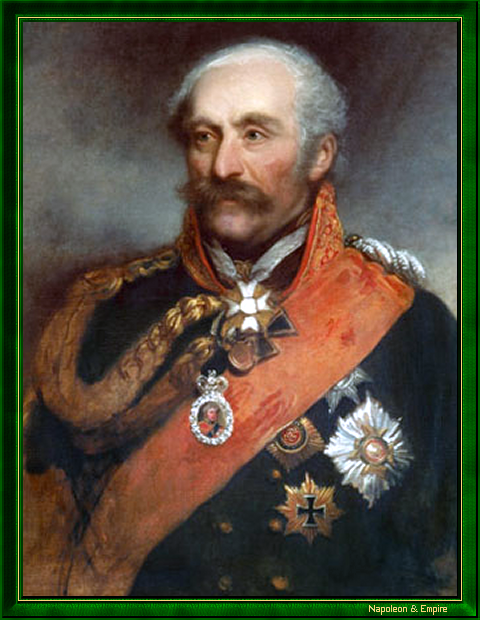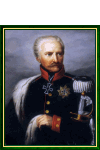Fürst von Wahlstatt

Gebhard Leberecht von Blücher was born into an old noble family in Rostock, Mecklenburg (now Mecklenburg-Vorpommern), on December 16, 1742. His father, Christian Friedrich von Blücher (1696-1761), was a cavalry master (captain) in the army of the Landgraviate of Hesse-Cassel. His mother, Dorothea Maria (1702-1769), belonged to the von Zülow family.
His career in the Prussian uniform got off to a curious start. A cornet in a Swedish regiment during the Seven Years' War, he fell into Prussian hands at Galenbeck in 1760 and found himself forcibly incorporated into their own troops!
He made a name for himself with his courage and fighting skills. In 1773, having become a captain, he requested and obtained his resignation following a special treatment of which he considered himself the victim. On June 21 of that same year, he married Karoline Amalie von Mehling, daughter of a Polish colonel, and then retired as a farmer on his father-in-law's land.
Fifteen years later, after Frederick William III's accession to the throne, he returned to service as a major (the rank immediately above captain). Lieutenant-colonel in 1789, colonel in 1790, the conflicts provoked by the French Revolution, during which he fought on the Rhine, gave him the opportunity to climb higher in the hierarchy. He became major-general in 1794, then lieutenant-general in 1801.
His reputation grew during the wars of the Empire, even though he suffered a number of bitter setbacks, such as at Auerstaedt during the Prussian campaign, where he commanded the vanguard. However, his fighting spirit enabled him to face the most humiliating situations with honor. Such was the case of his surrender at Ratekau on November 6, 1806, when he succeeded in imposing the conditions of his surrender on the French. It is true that he had just led the retreat of the remnants of the Prussian army to Lübeck with a pugnacity that was becoming legendary.
His short captivity in Hamburg was interrupted by a meeting with Napoleon at Finkenstein on April 21 or 22, 1807. All sources attribute his release to an exchange with General Claude-Victor Perrin, known as Victor. However, the dates of their respective freedoms (acquired as early as March 8 for Victor) seem discordant. Bluecher immediately resumed the course of his career, becoming Governor of Pomerania and Neumark in 1807, and General of Cavalry in 1809 (the highest rank in the Prussian army outside that of Field Marshal).
Bluecher's initiatives in his province displeased the French, who considered them contrary to the Treaty of Tilsit. At their request, at the end of 1811, Bluecher was relieved of his post as governor and excluded from any responsibility in the Prussian army. In 1812 he therefore did not participate in the Russian campaign.
His ostracism naturally became a recommendation a year later, when Prussia changed sides. Despite being in his seventies, Bluecher was given a major command when his country joined the Sixth Coalition alongside Russia, England and Sweden in March 1813. In the spring, at the opening of the Saxon campaign, his corps took part in the battles of Lützen and Bautzen. When hostilities resumed, interrupted for a time by the Pleiswitz armistice, he was given command-in-chief of the Army of Silesia, a roughly equal mix of Prussians and Russians. August Neidhardt von Gneisenau was appointed Chief of Staff. The two men developed a particularly fruitful cooperative relationship.
In August 1813, Blücher defeated Field Marshal Étienne Macdonald at the Battle of Katzbach. In October, he took part in the Battle of the Nations (or Battle of Leipzig), where he led operations on the northern front. His vital contribution to this victory earned him the rank of Field Marshal on October 20. He then hunted down the remnants of the Grande Armée with a dynamism that led his Russian, and later German, soldiers to nickname him "Marschall Vorwärts (Marshal Forward)". At the same time, he worked hard to convince the Allied sovereigns to bring the war to France.
On January 1, 1814, kicking off the military operations of the French campaign, he crossed the Rhine ahead of his entire army, which joined him from the 2nd to the 5th. Over the following months, the army alternated between defeats (Brienne, Champaubert, Montmirail, Château-Thierry, Vauchamps, Craonne), which did nothing to dent the general's determination, and victories (La Rothière, Laon), which galvanized it. All in all, while Blücher's energy, stubbornness and fighting spirit led him to make many mistakes, they also instilled in the other leaders of the coalition troops an offensive spirit that had long been alien to their nature.
The Allies' final march on Paris, regardless of Napoleon's final efforts, was largely due to his influence. The fall of the French capital was the immediate consequence, and just preceded that of the French Empire. Struck down by an illness that robbed him of his sight for several days, he was unable to take an active part in the fighting that led to the city's surrender.
These successes were rewarded with the title of Prince of Wahlstatt and a pension, which King Frederick William III awarded Bluecher in June 1814. The old marshal now dreamed of returning home to Germany, so much to consider refusing an invitation to London from the Prince Regent of England. A discussion with his monarch changed his mind, and he finally accompanied the latter, Tsar Alexander I, Prince Klemens Lothar von Metternich and other high dignitaries on their trip to England. The people and the court gave him a hero's welcome, and the universities of Oxford and Cambridge elevated him to the rank of Doctor of Laws. Following their example, the University of Berlin made him a Doctor of Philosophy once he had returned to Germany.
Bluecher moved to Silesia, where he remained until Napoleon's return to power called him back into service. The command of the Prussian army in Belgium was entrusted to him, and he and Gneisenau, once again employed as his chief of staff, formed back the tandem that had worked so well the previous year.
This did not prevent him from being severely beaten at Ligny on July 16, 1815, in an engagement in which he came within a whisker of falling to the French at the very start of the Belgian campaign. Trapped under his dead horse, he remained immobilized for several hours on the battlefield, in close proximity to enemy troops, at risk of being recognized at any moment . Only the dedication and astuteness of his aide-de-camp, August Ludwig von Nostitz, saved him from capture (or worse).
But this misadventure did not dampen his spirits. Once he had found his men, he decided to retreat to Wavre rather than Liège, in order to keep open the possibility of a rapid junction with Arthur Wellesley, Duke of Wellington's forces.
Good fortune to the latter, for on June 18, 1815, at Waterloo, the unexpected arrival of Bluecher's troops saved the Anglo-Dutch from the brink of collapse, and swung the victory to the Allies. Bluecher then pursued the enemy on forced marches to Paris, where he entered for the second time on July 7.
The following weeks brought him less satisfaction: Wellington began the slow work of transforming the Battle of Waterloo (Bluecher would have preferred the name Battle of the Belle-Alliance) into a purely English triumph; the prussian general's demands on behalf of his troops were ignored, and Prussian diplomats seemed too conciliatory to him. Even Bluecher's plan to destroy the Pont d'Iéna failed, whether through the incompetence of his artillerymen or the intervention of Louis XVIII with Wellington's support (sources differ and sometimes combine these various explanations).
Bluecher finally tendered his resignation, which Frederick William III asked him to postpone until after the signing of the peace treaty. A small consolation for a man who didn't seem to set much store by titles and decorations, Bluecher was among the first foreigners to receive the English Order of the Bath. Co-recipients were Karl Philipp zu Schwarzenberg, Michael Andreas Barclay de Tolly, Carl Philipp von Wrede and Royal Prince William of Württemberg.
Bluecher then retired to his castle in Krieblowitz [Krobielowice], Silesia, where he died on September 12, 1819.
"Gebhard Leberecht von Blücher, Fürst von Wahlstatt" by George Dawe (St James's, Westminster 1781 - Kentish Town 1829).

Gebhard Leberecht von Blücher's grave was devastated and his remains desecrated by Soviet troops in 1945.
As the title of Prince of Wahlstatt was granted to him on a personal basis only, his son, also a general in the Prussian army, bore only the title of Count. His grandson, however, was granted it again, this time on a hereditary basis, by King William I. His descendants still bear it. His descendants still wear it.
The letter in which Frederick the Great, whom he had infuriated, accepted his resignation in 1773 ends with these words: Captain von Blücher [...] can go to hell if it suits him
. Blücher's angry temper did not diminish with age, since the presbytery of Sombreffe which served as his HQ on the eve of the Battle of Ligny in 1815, preserves within it, on the top of a door , the trace of his furious sabre blows!
Two German warships were named in his honor, both of which met an unfortunate fate: a battleship cruiser, launched in 1908 and sunk in 1915 at the Battle of Dogger Bank during the First World War, and a heavy cruiser, launched in 1937 and sunk in 1940 at the Battle of Drøbak Strait.
The Blücher Order [Blücher-Orden] and Blücher Medal [Blücher-Medaille] are military decorations of the German Democratic Republic [Deutsche Demokratische Republik], created in 1968 to honor acts of bravery in war. However, as the country disappeared in 1990 without ever having been actively at war, there were no recipients of these distinctions!
Philately: The Post Office of this same German Democratic Republic issued in 1953 a 24 Pfennig stamp with the image of Field Marshal Blücher, then in 1965 a 5 Pfennig stamp showing him with his chief of staff August Neidhardt von Gneisenau .
Other portraits

Enlarge
"Feldmarschall von Blücher" by Ernst Paul Gebauer (Lietzen 1782 - Berlin 1865).